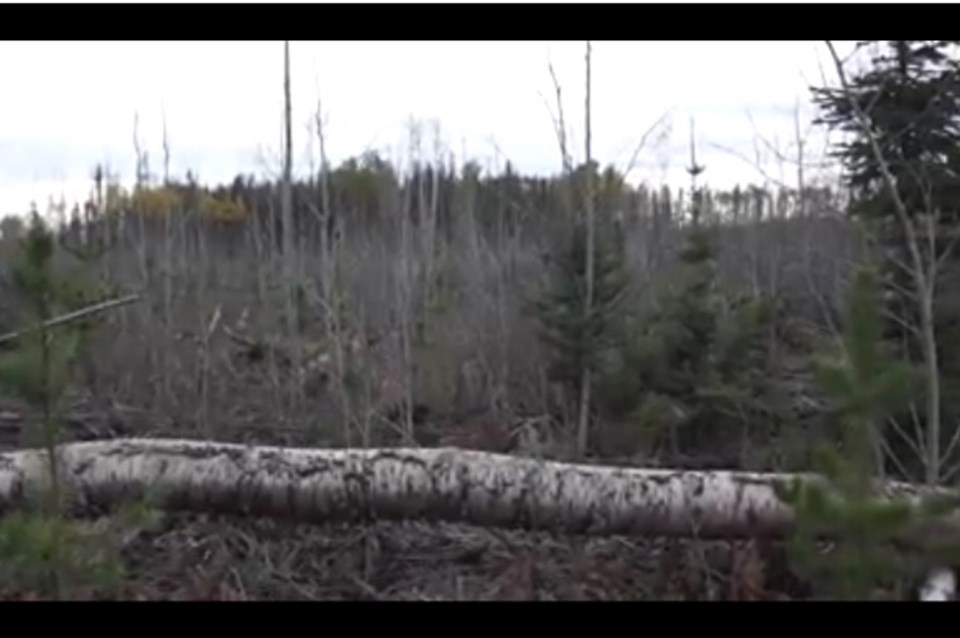A chemical-spraying program is sparking public apprehension, but officials call the campaign a safe way to ensure ecological balance.
Canadian Kraft Paper Industries has been spraying herbicide on certain sections of wilderness in the Flin Flon-The Pas region that were previously harvested by the company’s mill operations in The Pas.
The government-sanctioned herbicide is designed to kill hardwood trees and broadleaf shrubs, which helps softwood trees, namely spruce and pine, become established in those areas.
This helps Canadian Kraft Paper meet a provincial mandate to ensure the forest resembles its pre-harvest composition.
The spraying worries local resident Rod Harrower. He shared photos of formerly lush areas near Kisseynew Lake that are now barren, referring to them as “dead zones.”
“That tells you the concerns that anybody should have by looking at it,” he said of the photos.
“If you look on the pictures, the cattails are dead, the swamps are dead, the grass is dead.
“Everything is just gone.”
Harrower worries about the impact the spraying could have on wildlife and believes the herbicide could seep into waterways.
Flin Flon MLA Tom Lindsey has also been hearing concerns about the spraying.
He said people are worried about possible long-term health effects, both for humans and wildlife, and whether the spraying could impact drinking water.
Lindsey shares those concerns, noting there were times during his career in workplace health and safety when chemicals were used despite insufficient information about their safety.
He said he questions whether killing broadleaf trees is necessary for softwood trees to survive, or whether it simply speeds up the process.
A spokesperson for Manitoba Sustainable Development, the department that oversees herbicide spraying, said Canadian Kraft Paper’s campaign gives softwood trees a better chance of survival.
“If a young forest stand contains a large amount of hardwood trees and broadleaf shrubs, softwood trees can be suppressed and have difficulty establishing on the site,” the spokesperson said. “Herbicide results in a temporary reduction in vegetative competition, which provides softwood trees with an opportunity to become established and increases the probability that softwood will be a major component in the future forest.”
Forest renewal, the spokesperson said, is not just about ensuring new trees grow back after harvest, but also maintaining continuity in forest composition.
“Major shifts in forest composition could have negative impacts on the range of values the forest provides,” said the spokesperson. “In order to avoid major shifts, the province requires that the forest industry replace harvested forest with a forest of similar pre-harvest composition. Herbicide provides a tool that can assist industry in maintaining this balance on some sites.”
The spokesperson said vegetation impacted by the spraying will normally re-establish quickly, with shrubby vegetation often starting to recolonize the site by the following growing season.
As for health and environmental concerns, the widely used herbicide in question – known as VisionMax – has been deemed safe by regulators in Canada and the US.
Canadian Kraft Paper notified the public of the spraying program in an Aug. 2 Reminder ad. The spraying was scheduled to take place from Aug. 15 to Sept. 30.
The ad invited residents to submit objections to Sustainable Development. The Sustainable Development spokesperson said no objections were received.
Harrower believes the advance notice was too vague, failing to inform people that “they’re going to kill everything that’s got a leaf on it” in the sprayed areas.
He said the real issue is not whether the province approves of the spraying, but whether it is an appropriate measure.
“What they’re doing is maybe legal and permitted, but should they be doing it?” Harrower asked rhetorically. “That’s the question we’ve got to [ask].”
Other than the Kisseynew Lake area, areas subject to spraying include Sherridon Road, North Star Mine Road, West Arm Road, Payuk Winter Road and Dickstone Mine Road, among others.




